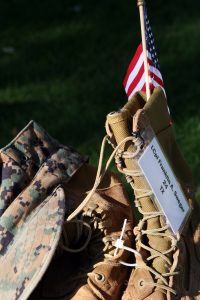
The newly signed defense appropriations law includes legislative language from a bipartisan, bicameral proposal introduced by U.S. Sen. Deb Fischer (R-NE) and U.S. Rep. Don Bacon (R-NE) to support the American families of military service members who died in battle.
The John S. McCain National Defense Authorization Act (NDAA) for Fiscal Year 2019, H.R. 5515, which became law on Aug. 13 with the president’s signature, includes a provision from the Gold Star Family Support and Installation Act of 2017, H.R. 3897 / S. 2088, introduced respectively by Rep. Bacon last October and by Sen. Fischer last November.
“Our Gold Star families have sacrificed so much, and Congressman Bacon and I were committed to doing more to support them,” said Sen. Fischer. “Working together, we were able to help these families more easily access military facilities and on-base benefits.”
Inclusion of the lawmakers’ provision “extends to the families of those who lost loved ones in service the respect, compassion, and gratitude they deserve,” the senator said.
Rep. Don Bacon said he learned that the nation wasn’t doing enough to support Gold Star families “after hearing the personal stories of so many” of them.
“I am thankful Senator Fischer partnered with me to ensure we remain committed for life to these families who have sacrificed so much,” said the congressman, referring to their provision in the NDAA that makes access to military installations permanent for Gold Star families.
Previously, such access was not standard protocol and dependents of service members who died during service could not visit a loved one’s grave site, for instance, nor receive grief counseling or attend a memorial service, according to a joint Aug. 13 statement released by Sen. Fischer’s office.
The U.S. House version of the Gold Star families bill had 89 cosponsors, while the U.S. Senate bill had 14 cosponsors. The House on Nov. 7, 2017, approved its version and on the next day sent it to the Senate, where it was under consideration by the U.S. Senate Armed Services Committee before making it into the NDAA.



